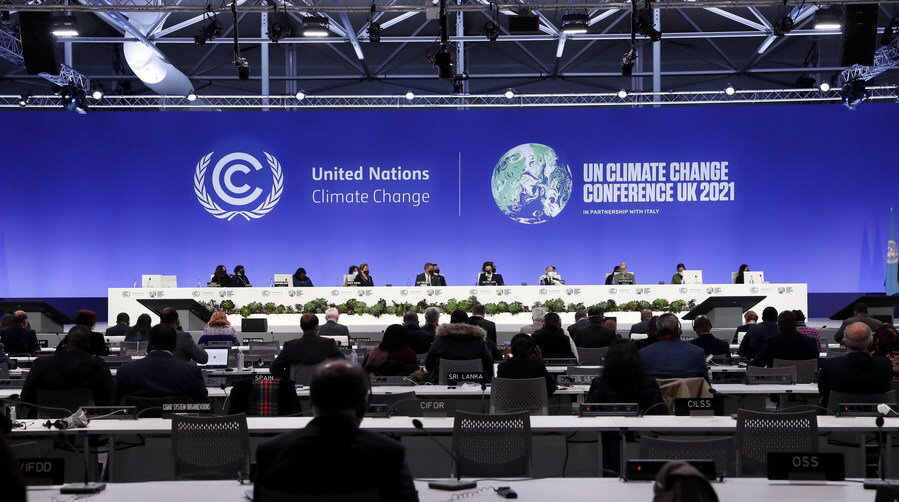Stephen Ndegwa

A general view of the opening ceremony for COP26 in Glasgow, Scotland, the United Kingdom, October. 31, 2021. /Xinhua
Chinese President Xi Jinping has been the center of attention in the last few days. As the leader of the world’s second largest economy, Xi’s remarks at global summits have drawn major attention as other leaders, as well as analysts, assess his thinking about the direction in which the world needs to go to avoid total destruction.
In his address to the event, Xi avoided the sideshows and dealt with the reality of the worsening situation. Rather than point fingers or engage in defensiveness, his conciliatory message was universal, stressing the need to adhere to multilateralism, take practical action and accelerate green transformation.
He also stepped in for developing countries by asking the developed world to step up the former’s capacity to thwart the vagaries of climate change. This is an obligation that needs to be taken seriously as poor countries are low carbon emitters but ironically some of the biggest victims of the repercussions.
China has never shunned its onerous responsibilities in tackling pollution, just like many of the largest global economies. This is not even a matter of debate but is an obvious by-product of a growing economy.
But unlike others who are in denial, the country has constantly spelled out measures that it has instituted to mitigate the damage caused by the hitherto inevitable carbon emissions, and its commitment to curb and alleviate the consequent climate change.
Photovoltaic panels on the roof of an enterprise factory building in Leqing Economic Development Zone in Wenzhou, Zhejiang Province, October 10, 2021. /CFP
A snapshot of the last 10 years, for instance, shows that China has phased out 120 million kilowatts of installed coal-fired power generation capacity. The country has also constructed the first batch of wind and photovoltaic power stations with a total installed capacity of about 100 million kilowatts. China has also often stated that it is working towards peaking its carbon emissions by 2030 and achieving carbon neutrality by 2060.
President Xi’s video remarks remind participants of the two August meetings to refocus on the problems at hand rather than on whodunit. One of the main reasons why the world is in a state of inertia in taking action against climate change is due to the politics, buck-passing and blame games surrounding the negotiations.
Some of these global forums have become talk shops, with developed countries using them to dress down their perceived enemies. Xi’s remarks in Glasgow resonated with his speech at the G20 Summit held under the theme, “People, Planet, Prosperity.” His speech was based on the premise that rich and powerful countries actually owe a living to the weaker members of the global community.
Xi was categorical: “Developed countries need to lead by example on emissions reduction, fully accommodate the special difficulties and concerns of developing countries, deliver on their commitments of climate financing, and provide technology, capacity-building and other support for developing countries.”
Beyond climate justice, however, the world is crying out for a common future devoid of the current grave challenges that threaten mankind’s existence on Earth. Just like the COVID-19 pandemic appeared seemingly from the blues, we do not know what other unpleasant surprises are lurking in the shadows to stop us right on our tracks.
Therefore, we must act resolutely, in unison, to defeat the common enemies and usher in a new system that empathizes with those who, if left on their own, stand no chance of survival.
Stephen Ndegwa is a Nairobi-based communication expert, lecturer-scholar at the United States International University-Africa, author and international affairs columnist.
 Africa -China Review Africa -China Cooperation and Transformation
Africa -China Review Africa -China Cooperation and Transformation
